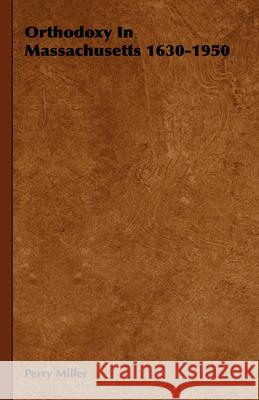Orthodoxy in Massachusetts 1630-1950 » książka
Orthodoxy in Massachusetts 1630-1950
ISBN-13: 9781443726597 / Angielski / Twarda / 2008 / 356 str.
Orthodoxy in Massachusetts 1630-1950
ISBN-13: 9781443726597 / Angielski / Twarda / 2008 / 356 str.
(netto: 163,89 VAT: 5%)
Najniższa cena z 30 dni: 173,53
ok. 16-18 dni roboczych.
Darmowa dostawa!
Orthodoxy In Massachusetts 1630-1650 by PERRY MILLER. Originally published in 1933. Contents include: FOREWORD xi PREFACE xvii I. SUPREMACY AND UNIFORMITY 3 II. DISCIPLINE OUT OF THE WORD 15 III. SEPARATIST CONGREGATIONALISM 53 IV. NON-SEPARATIST CONGREGA TIONALISM 73 V. A WIDE DOOR OF LIBERTY 102 VI. THE NEW ENGLAND WAY 148 VII. THE SUPREME POWER POLITICKS 212 VIII. TOLLERATING TIMES 263 BIBLIOGRAPHY 315 INDEX 321. Foreword: UPON the verge of publication I am fully conscious that in the work to be offered I have treated in a somewhat cavalier fashion certain of the most cher ished conventions of current historiography. I have at tempted to tell of a great folk movement with an utter disregard of the economic and social factors. I lay my self open to the charge of being so very naive as to be lieve that the way men think has some influence upon their actions, of not remembering that these ways of thinking have been officially decided by modern psy chologists to be generally just so many rationalizations constructed by the subconscious to disguise the pursuit of more tangible ends. In part I might take refuge behind the contention that a specialized study is, after all, specialized, that other aspects of the story can easily be found in other works. The field of intellectual or religious history may, I presume, be considered as legitimate a field for re search and speculation as that of economic and political. But I am prepared actually to waive such a defense and hazard the thesis that whatever may be the case in other centuries, in the sixteenth and seventeenth certain men of decisive importance took religion seriously that they often followed spiritual dictates in comparative disre gard of ulterior considerations that those who led the Great Migration to Massachusetts and who founded the colony were predominantly men of this stamp. It has not been part of my conscious intention either to de fend or to blame them, to praise or to condemn their achievement. I have simply endeavored to demonstrate that the narrative of the Bay Colonys early history can be strung upon the thread of an idea. Immediately this statement is made I encounter such authoritative rebuttal as that of Mr...
Orthodoxy In Massachusetts 1630-1650 by PERRY MILLER. Originally published in 1933. Contents include: FOREWORD xi PREFACE xvii I. SUPREMACY AND UNIFORMITY 3 II. DISCIPLINE OUT OF THE WORD 15 III. SEPARATIST CONGREGATIONALISM 53 IV. NON-SEPARATIST CONGREGA TIONALISM 73 V. A WIDE DOOR OF LIBERTY 102 VI. THE NEW ENGLAND WAY 148 VII. THE SUPREME POWER POLITICKS 212 VIII. TOLLERATING TIMES 263 BIBLIOGRAPHY 315 INDEX 321. Foreword: UPON the verge of publication I am fully conscious that in the work to be offered I have treated in a somewhat cavalier fashion certain of the most cher ished conventions of current historiography. I have at tempted to tell of a great folk movement with an utter disregard of the economic and social factors. I lay my self open to the charge of being so very naive as to be lieve that the way men think has some influence upon their actions, of not remembering that these ways of thinking have been officially decided by modern psy chologists to be generally just so many rationalizations constructed by the subconscious to disguise the pursuit of more tangible ends. In part I might take refuge behind the contention that a specialized study is, after all, specialized, that other aspects of the story can easily be found in other works. The field of intellectual or religious history may, I presume, be considered as legitimate a field for re search and speculation as that of economic and political. But I am prepared actually to waive such a defense and hazard the thesis that whatever may be the case in other centuries, in the sixteenth and seventeenth certain men of decisive importance took religion seriously that they often followed spiritual dictates in comparative disre gard of ulterior considerations that those who led the Great Migration to Massachusetts and who founded the colony were predominantly men of this stamp. It has not been part of my conscious intention either to de fend or to blame them, to praise or to condemn their achievement. I have simply endeavored to demonstrate that the narrative of the Bay Colonys early history can be strung upon the thread of an idea. Immediately this statement is made I encounter such authoritative rebuttal as that of Mr...











